The Amish at 2016 Horse Progress Days (15 Photos)
Ever heard of Horse Progress Days? It is an annual event heavily attended by Amish (we’ve covered a previous edition in Michigan here and here).
Here to explain more is David Arment of Restfulhome.net, with a look at this year’s event, held in northern Indiana.
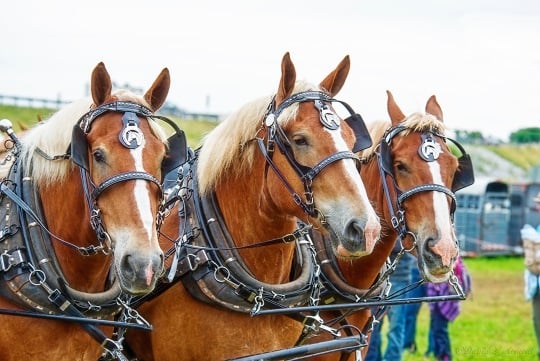
Horse Progress Days was held July 1st and 2nd at the MEC (Michiana Event Center) North of Howe, Indiana. The event had beautiful weather and was well attended. This was the event’s 23rd edition.
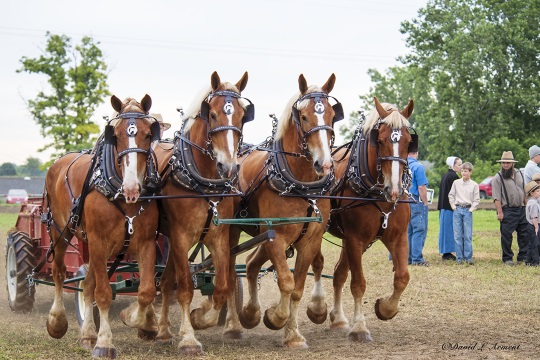
Northern Indiana is home to a large Amish population and Horse Progress Days is custom made for them. This is because Horse Progress Days has as its stated goals “To encourage and promote the combination of animal power and the latest equipment innovations in an effort to support sustainable small scale farming and land stewardship. To show draft animal power is possible, practical and profitable.”
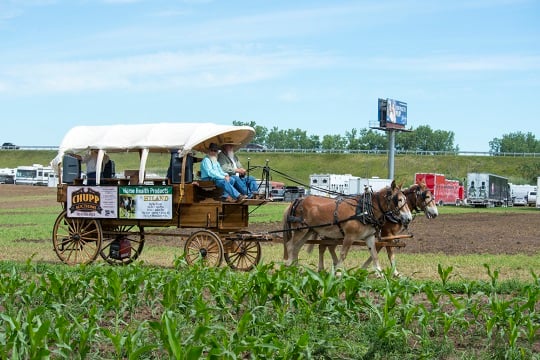
The event had demonstrations in the fields near the event center with multiple events taking place simultaneously. There were demonstrations on tree and lumber cutting, herding animals with dogs, and horses in the fields working.
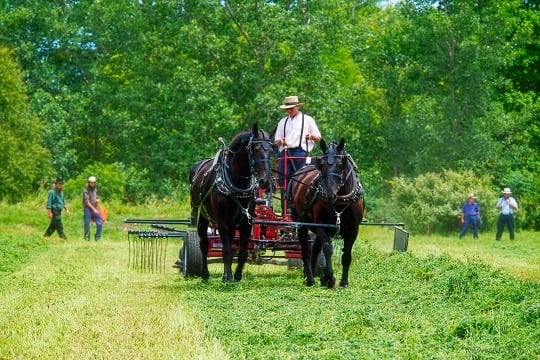
The draft animals in the fields were mostly horses, but a pair of oxen did hay raking and a pair of donkeys also participated in the events. The animals demonstrated manure spreaders, plows, other cultivating machines, cut hay, raked hay, baled hay and wrapped hay. Multiple teams of horses did each of these activities.
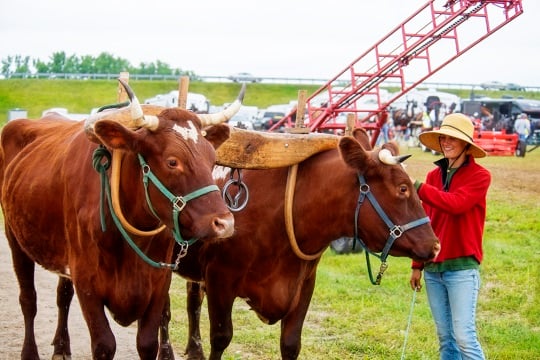
There was also a demonstration of riding draft horses, where these large animals showed off how well they can be ridden and how well-groomed and beautiful they can be.
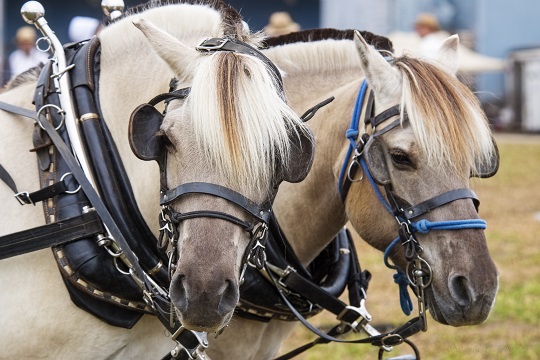
Indoors could be found vendors who sold the equipment in the demonstrations outdoors as well as many vendors who sold ancillary products for farm families.
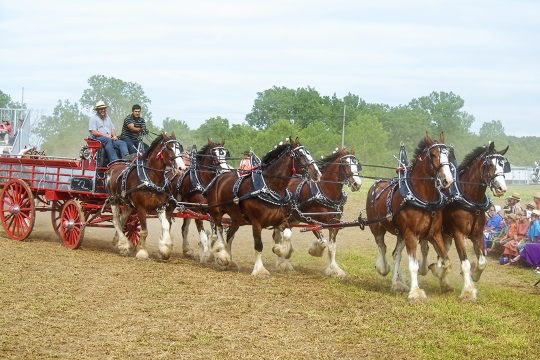
Late in the afternoon in the arena, demonstrations were held with teams of horses pulling wagons. There were many six-horse hitches with different breeds of horses.
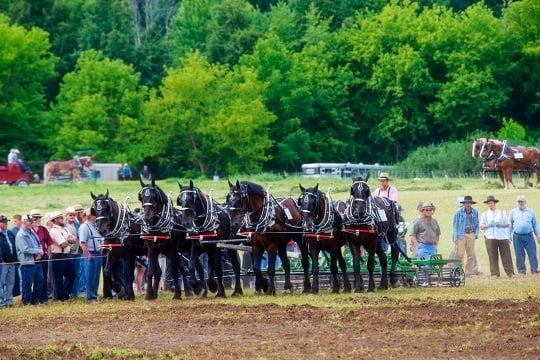
It is hard not to characterize the event as “carnival like”, but in the subdued and respectful manner that Amish events seem to enjoy.
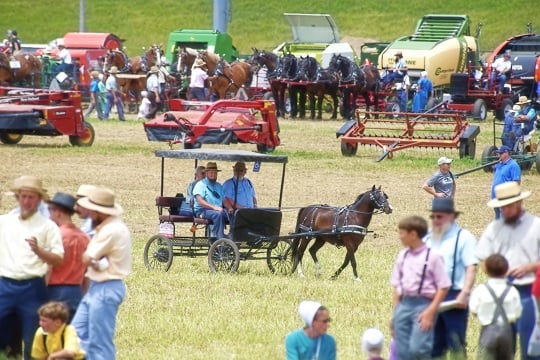
The food vendors, (with my perpetual favorite being the kettle corn), the demonstrations of everything from tomato growing to exotic animals (camels, lamas and the like) and oxen and donkeys in teams making what appeared to be random appearances on the grounds, all contributed to the feeling of discovery and expectation… What might I see next?
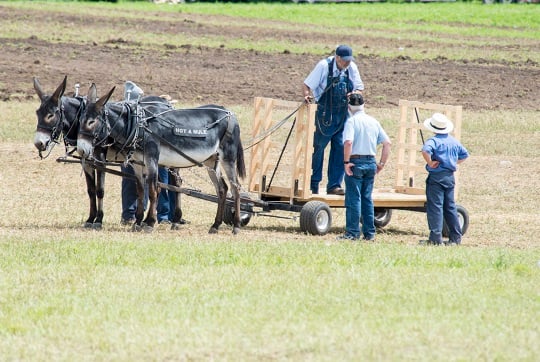
There is a need for equipment that is pulled by horses so that Amish and others can continue to farm with horses. Years ago the horses simply pulled the same equipment that tractors pulled.
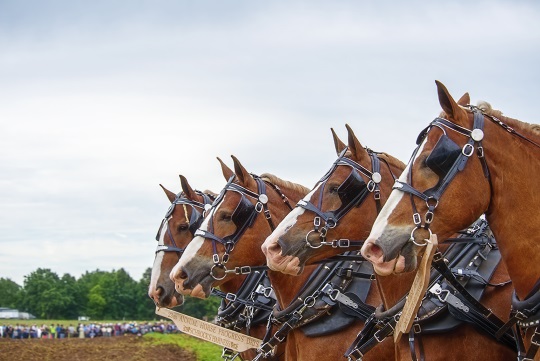
Actually that is perhaps said backward as draft animals were used for farming before tractors. So in the earliest days tractors pulled the same equipment that horses pulled.
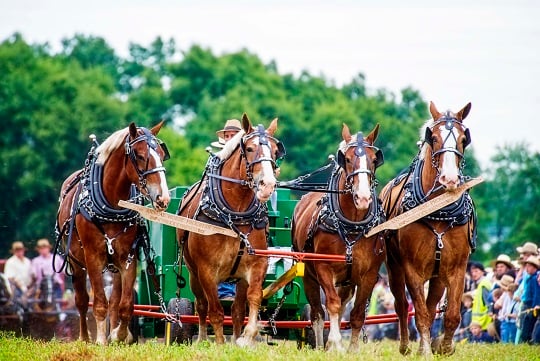
In any event, as tractors became more powerful the equipment they could pull became larger. As the older equipment that horses could pull wore out there was a vacuum for equipment to fill that space. Now equipment is manufactured with draft animals in mind.
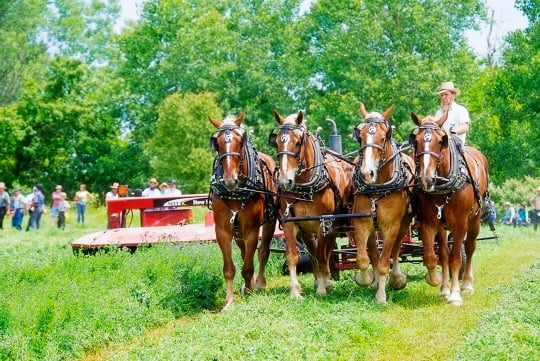
Horse Progress Days helps the Amish and other farmers who use draft animals find the latest in new machinery that can be pulled by their animals.
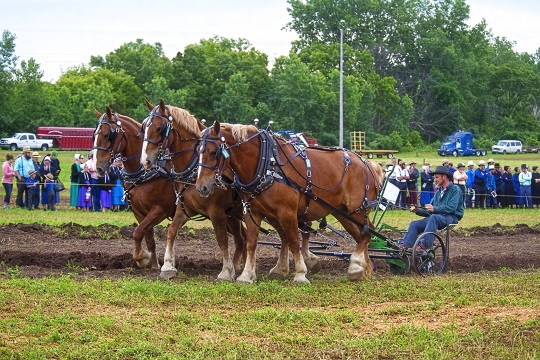
While equipment is a very large part of the demonstrations, most of us cannot get past the horses. And Amish love their horses. So the horses are all groomed and have on their very best harness. To the eye of the horse lover, this is a wonderful sight.
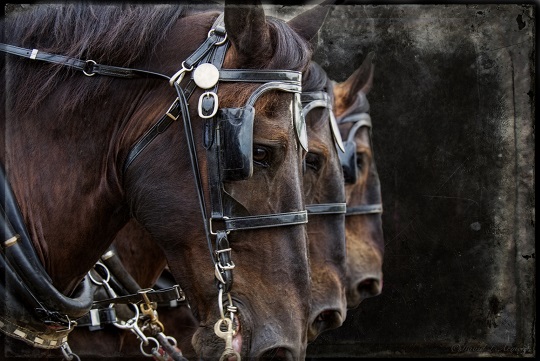
In many respects this is more than just an event that showcases farm equipment and the horses that pull them, it is a celebration of Christian Faith and traditions. To quote from Dale K. Stoltzfus in his explanation, “Horse Progress Days: Why? What For?”:
“…that stubborn group of souls called Amish continued their efforts to weave their understandings of Christian Faith and traditions into their everyday lives, within the larger cultures and societies in which they lived. And a big part of the tradition of living out that faith was, and is, the use of horses to farm. And even though the big tractor equipment manufacturers more and more abandoned production of horse drawn farm equipment, the need for it never went away. And in empty spaces in barns and sheds on Amish farms, lads who felt at home with nuts and bolts and welders studied the equipment that their counterparts in the ‘modern’ world were abandoning, and figured out ways to make it themselves. In the meantime, the numbers of individuals who were born Amish continued to grow and large numbers of young people in Amish communities chose to embrace the faith of their fathers and mothers…”
This event is a traveling event. Next year’s edition takes place in Pennsylvania.
David Arment is the owner of Restful Home, an outlet for Amish-made home decor, including “standout plaques”, carved wooden signs, message boards, and more. Restful Home is one of our advertisers at Amish America, and if you’d like to support what we’re doing here, check out David’s site for some neat products made by the Amish for your home.






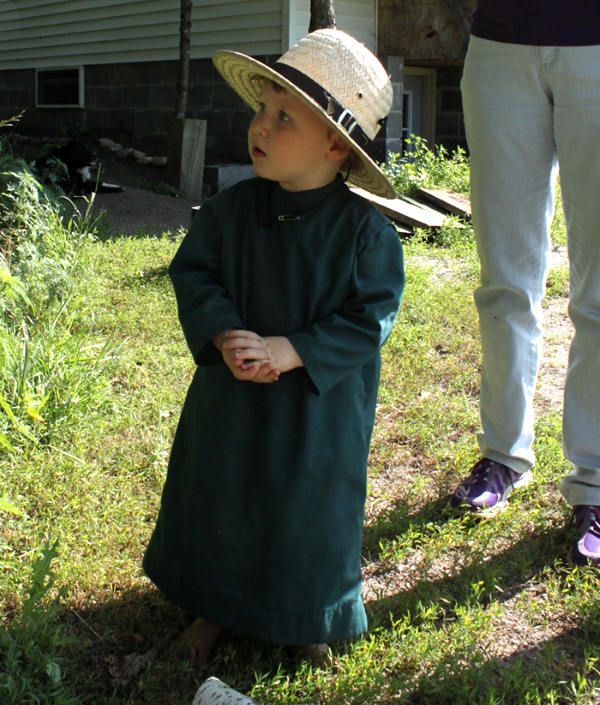
Fun Times...
Looks like a fun time for those that attend. Are there any new horse pulled items that come out every year or two? If so, what are they?
Tom in Lincoln, Ne
Replies to the Above
I was at HP Days to take photos for myself, Amish America, and a local company. My time was fully focused on capturing images so I didn’t apply myself to understanding what was new.
So Tom G, the portion of my small brain that was listening heard them talk during the plowing demonstrations, how with gas engines the plow manufacturers do not work on the efficiency of the plow head because there is so much horse power to pull the plow through the field, BUT when you are using work horses this is a real issue so small things add up and so creating a plow that will cut and turn the soil efficiently is the type of thing that these machine shops work on and sell to the Amish.
And as was said the size of machines that horses can pull is different from what tractors can now pull. So about everything that you need to farm was at this exhibition. Even a machine to plant cover crop while the corn is still in the field.
And has been mentioned by others, people were there from across the United States and beyond who are interested in farming with horses. This is the ultimate in environmentally friendly farming, so you don’t just have to be Amish to want to do this.
As to the mention of the nice harness… I do printing work and other work for an Amish company. Three generations of the family work there. I had occasion to be in the van (car) taking the Amish owner to the print shop and he wanted to stop by the harness shop to get his new harness for Horse Progress Days and the team of horses he had demonstrating there. We made two stops at two different harness shops. Most all of the harness is new or if not new polished up and made to look nice.
I take a few pictures of horses and some of them are used by the company mentioned above. The owner has an eye for horses. His being Amish is the main reason why. He sees things that escape me. Harness is one of the things he sees that normally escapes me… but I’m learning.
Best Regards,
David Arment
"New" items at HPD
Tom; I can’t really answer your question as to whether “new” horse drawn items come out every year or two as I have on been to HPD one time & that was this year’s event in Howe, IN.
I got the sense though that nearly every manufacturer had at least one or two items that had been upgraded, revised or modified from the previous year’s model. Several times there would be a piece of equipment demonstrated by one company and then there would be a similar one, with maybe a slightly different method of doing whatever specific task that the equipment was designed to do.
The funny thing is when one company comes out with a new approach to doing some particular job, it is apparently not long before their competition comes out with their version of the same tool. The announcer commented on this several times and said there was a good natured sense of competition between the various companies that manufacture this equipment. I like the sound of that.
I’d guess that, really, it is not important that new equipment is made available on a super frequent basis for HPD to be relevant to their target audience. Since HPD rotates annually to one of six geographic areas, most of the attendees may have never seen any piece of equipment that that had been introduced in the previous 5 or 6 years, as the vast majority of the plain people in attendance are fairly local to the event. Hope what I said makes some sort of sense.
Thank you for this post, including the many pictures. I was fortunate to have been able to attend both days of this year’s Horse Progress Days, and thoroughly enjoyed it. I had been to H.P.Days at Arthur, Ill., and twice at Daviess Co, Ind., but this was the biggest H. P. Days I had attended. I was there from early morning until early evening both days. There was so much to see and do, there was no way I could do it all!
One of my favorite seminars that I attended was the International Seminar. Each year there are people from several different countries outside the U. S. who attend H. P. Days and from hearing them speak, they truly appreciate what they learn there that they can take back to their countries to help improve horse-drawn, oxen-drawn farming in their countries. It seems like several of them spend time before or after H. P. Days visiting on Amish farms and experiencing more of Amish farm life and Amish community life. I will never forget what a young farmer from Colombia shared (and I paraphrase): “In my visiting in your (Amish) farming communities, I experience a sense of joy, peace and support of each other that I do not experience in my own country, and I am grateful for your sharing your life with me.”
Horse Progress Days rotates between sites in Northern Indiana, Pennsylvania, Michigan, Ohio, Illinois, and Southern Indiana. If it is anywhere within driving distance, I would encourage you to attend to experience an important, authentic part of Amish life today.
Such beautiful horses. Thank you for sharing. Very interesting .
What handsome horses (oxen too, of course!)! I’m impressed by the beautiful leatherwork of the harnesses, etc. Everything hand-crafted is a work of art, in my opinion.
I truly loved the beautiful photos…wish I could have attended to see it all in the flesh, so to speak.
It’s heartening to know the Amish attract an international following, too.
Like Tom G., I’d like to know about any new horse-powered items, too.
I found this all fascinating, and thank David Arment for sharing!
Alice Mary
To: Alice Mary
The bulk (probably all) of the harness was produced by local harness makers. Not sure if it was donated, loaned or purchased for the event.
The announcer(s) that were describing the field equipment would first talk about each hitch of horses (the use of which was also donated); their ages, name and who owned them. They would also describe what type of farming operation the owner of that hitch was involved in. Then they would mention which harness shop produced the harness that was on that particular hitch.
You will probably be surprised to learn that little, if any, of the harness used was leather. They now use synthetic material; some of it is called “Biothane” and some is called “Beta”. One is made from PVC and the other is either polypropylene or one of the other “poly” products. I forget which is which.
Biothane is available in several finishes and is used primarily for the harness. Beta is used primarily for the lines (reins) as it is softer and more pliable than the Biothane. It is not as resistant to abrasions, hence is not used for the actual harness.
The reasons for using synthetic material are numerous; it is lighter than leather. It is also as, or even more durable than leather. It will not dry rot like leather will, it is not affected by perspiration and can be cleaned with a simple application of soap and water. It does not require frequent applications of oil, as does leather. Most of the harness hardware is now stainless steel, so the maintenance of it is almost non-existent.
The Amish at 2016 Horse Progress Days
I enjoy the pictures it brings back memories and I like the way of life,,,
Horse
Horses are some of God’s more interesting creatures. Having first been domesticated about 3,000 years before the Old Testament was even written, the horse has been the work companion of humans for more than 5,000 years. Which means…
We have been friends with the Horse, longer than we have been friends with God in the Judeo Christian religion.
As a city girl, I have always thrilled at the sight of a horse. Every summer, my Dad and I would go to the races, in awe of their speed, strength and beauty (never knowing until much older how much those animals suffer at the hands of spurious owners). I have travelled the world, yet only one time in my life have I had the fortune to meet a horse that worked in a way that reflected its 5,000 year old purpose, that of tilling the land.
A long time ago when I was travelling to the Alps of Switzerland, on the long trip, we pulled over to eat. Back then, I travelled with my own little companion, a West highland terrier, who was very obedient and never left my side. Except for this time. Once I opened my car door, he ran out in back of the diner, barking like he was chasing a squirrel. I ran after him calling his name and then stopped in my tracks, stunned, and my mouth agape.
Behind that diner was a farm, and right next to the fence was the biggest draft horse in the world (at least to me). He was huge. I was frightened, for my dog as well as myself. I was scared this gargantuan animal would stomp my little terrier with one hoof and kill him. He was so big. And then something so beautiful happened.
My dog ran up to him, and the big creature reached down to him with his big nose – and they smelled each other. Then, they both began to run and play in the field together. (To be honest I was still scared my little guy was going to get squished) But that big Swiss horse looked out for him, and they honestly enjoyed each other like long lost friends. They played for 20 minutes straight and then my dog came back, stinking of manure, no longer white, but the color of mud, happy as a clam with his panting tongue hanging out.
I never forgot that horse after all these years. I’ve never forgotten the feeling of seeing that huge animal in all its glory, galloping. So much strength and beauty and gentleness all wrapped up into one of God’s creatures.
Some people feel sorry for horses that work fields. I don’t. I think a horse is at his happiest after a long day’s work, munching grass in a field and playing with a new friend.
Obviously I would love to go to one of the Horse Progress events. Maybe one day I will.
Thank you for a beautiful vision, I won’t forget!
Judith's Post
Hi Judith, I love your post. I know there are people who don’t think horses should work. My view is that their bodies are not a whole lot different from ours in the respect that they do better when “worked”. My wife has high blood pressure and she is convinced by taking her blood pressure every day that the best thing she can do is “work” her body, so she rides a biclyce at least 8 miles every day.
I would think a horse standing in the field or in a stall would not be as healthy as one that pulls a buggy or a plow. Now of course all things need to be done in moderation and you can “over do” anything, but within the bounds of common sense, it seems to me it is better to exercise (work) than not.
Thanks again for your post. I would like to have seen you little dog meet his new, best friend and run in the field of Switzerland.
Dogs and horses
Judith; Xena, our little 11 pound mini-Dachshund is afraid of a butterfly, but we have to watch her when I am feeding my team of draft mares.
If the mares get too close to us, Xena apparently thinks that they intend to harm us and she will charge at them. She will nip them on the nose when they put their heads down to look at her. A butterfly terrifies her, but a 1,700 pound mare does not! Go figure that one out.
Xena
It sounds like Xena lives up to her name! Xena, The Warrior Princess! 🙂
Thanks for all the very handy information on HPD, OldKat. I appreciate that. I hope someday my travels will coincide with a visit to one. The cost of $90 seems to be for the whole weekend, no? What about children, seniors and military – do they get a discount? I must say, for some hard working people that possibly could be a steep price, if one wants to bring a big family. (Disneyland is over $100 a day now – to prove how old I am, the first time I went to Disneyland it cost my parents less than $5.00 in 1965. I was two years old).
Judith, double-check the website. The $90 is likely for the bus tour that goes around to various Amish businesses, farms, etc. and might include a meal. I’m not sure how it’s always done in other areas, but that was the case here in Holmes Co. and the admission fee & parking were much less. OldKat could probably give you more details and correct me if I am wrong.
Judith — Mark and Old Kat are correct. The $90 is the fee for the all-day tour on Thursday, the day before Horse Progress Days begins. Admission to Horse Progress Days this year was $10 per day for adults. Children ages 12 and under are admitted free as long as they are accompanied by an adult. There is no senior citizen’s discount. The $10 per day ($20 total for both days) is well worth it. There is so much to see and do, there is no way to see and do it all! I’ve been to four Horse Progress Days and hope to go again as soon as I can.
Ooops ...
I didn’t see that Al had already addressed this when I replied to Judith’s query on the costs.
If anyone decides to go to HPD, it will probably cost far more to get there than it will to actually attend the event itself. At least that was the case for us.
HPD costs
Yes, Mark is correct … again … regarding the costs. Sorry if I wasn’t clear on that. The “Tour” was $90.0 per person, but that was ALL day and included 6 stops, a FANTASTIC lunch and a nice, air conditioned bus to ride around in. Of course, it was an optional thing but as I said in the other post I think it was well worth the extra cost.
The tour group (actually two buses that went separate routes, but to the same stops) was largely “English”, though there were three young Amish couples on our bus. Not sure if there were any on the other bus or not.
Horse Progress Days itself was either $10.0 or $20.0 per person (I forget which) for a TWO DAY pass, which also included parking. Very reasonably priced. The food that was available was also very reasonably priced (& good) and, again, if I remember correctly … the proceeds were to be used for the local Amish schools.
We have been planning on going to HPD for probably 5 to 7 years, but something always came up the prevented our going. This year everything fell into place and it was probably the highlight of the best vacation that we have ever taken.
We plan to go to either the European version of HPD next year in Germany, or to HPD itself in Leola, PA. Though we will flying to which ever one we choose to attend.
Horse Progress Days
Hi Al,
If you looked carefully you might have seen my son, Mark, at the Horse Progress Days. He doesn’t go every year. But there was a van load going from Belle Center and they asked him go go along and so he did. He told me that with his knee troubles he was glad for the horse drawn shuttles taking folks around. He told me that the proceeds from the food stands was to go for the special education classes in the Amish schools in that area.
Don — It would have been interesting to visit with Mark, also with Oldkat and any other Amish America readers who were at Horse Progress Days. Maybe at next year’s Horse Progress Days we can set a time for an informal meeting over lunch for interested Amish America readers to visit with each other, if it’s OK with Erik.
Of course! Sounds like a great idea.
Great idea
I would have LOVED to meet anyone that posts on Amish America and of course Mark, too! Maybe ESPECIALLY Mark.
If the bride and I end up going to Leola, PA next year I will make it a point to let Erik know in advance. Who knows, maybe someday we will get the old mystery man himself, Erik Wessner to make an appearance.
Meeting Mark
Well, if I’m around by the next Horse Progress Days, at 93 you take each day at a time. Anyway, if I’m still kicking I’ll let you all know if Mark is going to be going to the Horse Progress Days. I’m sure he’d be glad to meet all of you.
That sounds interesting.
WHEN is the next H & P Days? Is it always a particular weekend or day of the year?
Check out the website for Horse Progress Days. It’s usually held around July 4th. In 2017 it will be in Lancaster Co., PA, if I remember right.
That’s great! I have relatives in Allentown and will plan a visit around that time. Thank you for the head’s up!
Thanks for all the good info! I’m planning to go next year and hope my cousins, who have a large RV are up for a little foray into the country! 🙂 Maybe I’ll meet some fellow amishamerica readers there?! 🙂
Correct
Mark is correct. It is held the weekend of, or the one immediately preceding, July 4th. It is always held on a Friday and a Saturday, though there is a tour on that Thursday.
There is an extra charge for the tour, and while it is not cheap (this year it was $90.0/person)it is worth it. At least this year’s was; we had never been to HPD before this year.
In 2017 HPD will be on June 30th and July 1st. It will be in Leola, PA … which is in Lancaster county.
Thanks for the information, OldKat.. It’s going into my phone’s calendar now! Are there places that are better to stay than others. I may or may not be coming in an RV.
God have mercy.
I am saddened and sickened to report that I read this in the Washington Post today. It breaks my heart. I can only hope that God forgives this man and that he understands the severity of his actions. Amish or not, there are evil people in this world. I feel he should be banned from ever owning another horse for as long as he lives.
https://www.washingtonpost.com/news/morning-mix/wp/2016/08/06/amish-man-beat-overburdened-horse-until-it-collapsed-police-say/
I couldn’t read the whole article because tears filled my eyes.
Judith, I could second your “title,” God have mercy. I did not know about this until I saw it on here this morning, but it’s sickening and appalling. That this Mennonite man (and it could have been an Amish man, but the surname Sensenig and his dress indicates this is an Old Order Mennonite man) could act in such a cruel manner is shameful.
I can only hope readers will know that not every horse owner is like this! But as I have often heard a well-respected bishop say, “We cannot all share the blame, but we must all bear the shame.”
Long Rant Alert - please scroll over if not in the mood.
Mark, it saddens me that the Amish usually take the blame in the media for the sins of all plain people. And that Bishop was correct. As Catholics, we too have had, and earned, our fair share of blame and shame for old sins never forgotten, and sins anew. It just takes a small group of individuals who can ruin things for the larger group.
I re-read the article with clearer eyes this morning. I also noticed the man was not older. He was 20 years old. A young man. Inexperienced, no doubt. Inpatient, no doubt. Unable to cope with frustration, no tools in his arsenal to deal with stress.
But old enough to perhaps have learned that behavior from others. Old enough to have seen others get a reaction from a horse by kicking it. Old enough to have been around and have known horses for two decades. Old enough to know that horses do not come cheap. Heard enough sermons to know that horses are part of God’s creation. Old enough to know better. And yet he continued in front of others, continued to abuse the horse whilst others watched. Which makes me wonder….
Was he perhaps developmentally disabled? Was his mind that of a child’s? Was he not educated? Or was he a sociopath, who had no feelings, no empathy for his work companion? Would he kick his brother if he fell in the field, hot and panting from exhaustion?
I don’t think this can be explained away the old standby that “People on farms treat animals different, as livestock”.
My grandmother grew up on a farm in Poland (a life harder than most Amish today endure). She escaped from a German work camp during the war (interesting story), walked to Paris, and then came to America. Here in California, my Uncle had an avocado farm, with ducks and chickens. Every Christmas we had duck soup, which was a traditional Polish dish. I know what happens in order to get that duck soup – because when I was around 10 years old, my Babcia taught me how to kill a duck. She said “A duck does not understand death. But you must be merciful, because they are God’s creation. You must do it quick, without hesitation, or the duck will suffer.” The goal was not to let the animal suffer.
I was taught that at age 10, from a five foot woman who grew up with no running water, no electricity, a strong, Catholic peasant who worked the fields, took care of her own pony as well as 4 big draft horses, who stopped, knelt in the soil and prayed the Angelus when the bells from the distant steeple rang during the day. A woman who never went to school one day in her life. Who worked on a farm just as hard as the men did.
But she knew that. She knew animals were not put on this Earth to suffer from our hands. She taught me that – at age 10, even though she knew I was a city girl, who would not be living on a farm anytime soon, or ever.
I wonder why this man of 20 was not taught this.
Judith, you raise some interesting points. I never thought about the possibility of him being developmentally disabled. I’m guessing he is not, or he would hardly be out on the road alone, but who knows. I’m leaning more towards someone who is simply not in control of his temper and/or hard-hearted. A sociopath? Perhaps, but I’m guessing we’ll likely never know. And you are right — 20 is still young but yet old enough to know right from wrong. I’m not sure if we can assume he was not taught this. We can teach our children something, but there is no guarantee they will all take it to heart and follow it.
We were taught much the same as your grandmother — that to cause an animal to suffer needlessly is wrong. Obviously when butchering or other less-final-but-still-gory farm procedures, there is going to be some degree of pain. But a skilled and caring person will know how to make it as quick and painless as possible and want it so.
Irregardless of what he was or was not taught, this boy’s actions were wrong and shameful.